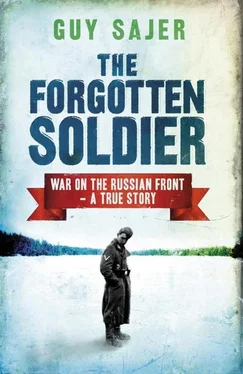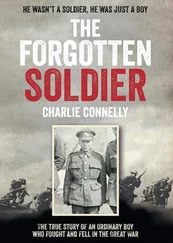Despite the hard work, and the endless watches and patrols, we regained some of our strength on a diet which was no longer tightly rationed. Meat had the greatest effect on our physical wretchedness, and we absorbed it, as the war absorbed everything, with maximum determination.
Grandsk had returned to his old job. With the help of civilian volunteers, he set up a huge kitchen in an open shed. Two trucks shuttled between Zoppot, Gotenhafen, and Danzig. Ammunition for the front was organized here, and transported in small loads. With the exception of a few air raids, life went on in a state of striking calm, which seemed incompatible with the gravity of the hour, toward the end of the war, in the beginning of 1945. Even the cold had lessened, and we no longer dared look at the sky, which brought us such indecent clemency. We spent long hours engaged in activities created by the necessities of the times, but which nonetheless seemed to us like a diversion.
Then one day toward the end of February an organization which we thought no longer existed invited us back to Gotenhafen. Our Gross Deutschland group had collected a few fragments which were to be embarked for the West. Everything seemed to be improving. We separated ourselves from the battalion which had utilized our service, and said goodbye to the comrades we had made. Grandsk left the kitchen he had organized so efficiently, with regret. This break, however, saved us from the horrible ordeal in which that battalion was practically destroyed. Heaven, which had so often overwhelmed us, spared us this time.
Russian tanks moved in from the west, and a storm of fire of unequaled violence broke over the positions we had so judiciously arranged. Our men took the first blow, but were soon swept aside. The Russians suffered frightful losses, but as we had learned, this made little difference to them.
From Gotenhafen, where we were waiting for orders, the roar of the war rang louder than ever. Russian infiltration had penetrated to within six miles of the city, and our retreating troops were engaged in fierce fighting. Through the rain of shells which cut them down, the fleeing civilians entrenched in the countryside moved back toward town. Large German battleships were firing from the sea at advanced Soviet positions. The ground trembled and shook, and any window panes still in place fell out.
We were trying to impose some sort of order on the swarm of terrified civilians who wished to embark for Hela. Retreating troops were also arriving in the city, which indicated that we could no longer count on our barrage. The town was gripped once again by frantic panic, and the civilians making their way to the port completed the paralysis of the order which had been maintained until then only with the greatest of difficulty. Although we all had evacuation papers, we were rounded up once again and sent to Zoppot to fill a gap in the line.
We left Gotenhafen, where despair had assumed a pitch of delirious intensity. With dry mouths and rage in our hearts, we climbed into the civilian cars which were to take us to our new Golgotha. Through the windows, which we kept shut against the cold, we watched the sky, where flights of fighter-bombers buzzed like enraged wasps.
At Brössel, we left our cars to plunge directly into the rubble. The town rang to the sounds of an exploding universe. The Russians were attacking everything that moved with rockets and bombs, and their planes came over so low we could almost see the grins on the pilots’ faces. When they had gone, we moved back to our rickety cars, and started off again, through the flying dust. The road was strewn with rubble, and several times we had to dig our way through. We also had to skirt the enormous shell holes into which we otherwise would have disappeared entirely. Our journey ended when we were dumped, with our Panzerfaust, at the edge of a small village. We could hear the big guns some ten minutes to the south.
We ran toward a leafless hedge with a sidecar pulled up beside it.
We thought we might receive some instructions, but we arrived too late: both occupants of the sidecar had been shot. The driver had collapsed over the handlebars, with his back reduced to a bloody pulp. The other man appeared to be asleep, but he too was dead. The bursts sounded closer each time. We had never imagined that the Russians were so close. Where were the rest of our men?
Then we caught sight of them. We climbed over a garden hedge, and came out onto a smooth piece of ground which sloped up to the horizon, some two hundred yards beyond and above us. Continuous trails of smoke marked the discharge of big guns and the impacts of their shells, and the gray sky was lit by flashes of white light.
We had to reach that high ground whatever the cost, and we all had our passports for the West in our pockets. I knew very well what kind of curse lay behind the closed faces of each of my companions.
As if the malevolence of the situation were drawing us on, we completed our progress with a series of carplike leaps which were unknown to any system of physical training.
Three German half-tracks, which had been resuscitated from some unit, were pointing their D.C.A.s at some twenty motionless Soviet tanks, waiting on the brown-and-white ground. Soldiers crusted with mud crouched in shallow, hastily dug holes, pointing various antitank weapons at the monsters, which kept their distance. We had barely taken our places when a new salvo came over — first the bursts, and then a thick fog of smoke, rolling toward us, level with the ground. We could hear cries and moans from our positions. The half-tracks, which were more sheltered, were also firing, and all further speech was blotted out.
The Russian tanks, which still did not move, began to fire too. Some of them seemed to be paralyzed, and the smoke leaking from their entrails mixed with smoke produced by our side, which a generous wind was blowing toward the enemy.
Then an inhuman order sent us forward: as the tanks were not rolling toward our Panzerfausts, we had to go out to meet them.
In a series of miraculous leaps we moved forward for several yards, through bursts of machine-gun fire which felled several of my companions.
Our fear reached grandiose proportions, and urine poured down our legs. Our fear was so great that we lost all thought of controlling ourselves. We drew still closer, tearing convulsively at our faces after each leap. The tanks were unaccompanied, and their myopia made their aim uncertain. One of them was burning, some sixty yards from a hole into which six of us had crowded. Then some of my comrades moved out. I stared after them with enormous eyes as they mocked their imminent deaths. Three tanks were moving toward us. If they rolled over the mound which protected us, the war would end for us in less than a minute.
I can still see those tanks, blotting out everything else. I can also see the metal plaque, and the nose of my first Panzerfaust, and my hand, stiff with fear, on the firing button. As they rolled toward us, the earth against which my body was pressed transmitted their vibrations, while my nerves, tightened to the breaking point, seemed to shrill with an ear-splitting whistle. Once again I understood that one could wear out one’s life in a few seconds. I could see the reflected yellow lights on the front of the tank, and then everything disappeared in the flash of light which I had released, and which burned my face.
My brain seemed paralyzed, and made of the same substance as my helmet. To the side, other flashes of light battered at my eyes, which jerked open convulsively wide, although there was nothing to see. Every thing was simultaneously luminous and blurred. Then a second tank in the middle distance was outlined by a glow of flame. It had not been able to take the three projectiles we had lobbed toward it with a considerable degree of precision. Our fingers clutched feverishly at the launching tube, which jutted against the sky somewhat to the left of the burning tank. We could hear the noise of a third tank crossing a hillock just beyond our position. It had accelerated, and was no more than thirty yards from us, when I grabbed my last Panzerfaust. One of my comrades had already fired, and I was temporarily blinded. I stiffened my powers of vision and regained my sight to see a multitude of rollers caked with mud churning past in a dull roar of sound some five or six yards from us. An inhuman cry of terror rose from our helpless throats.
Читать дальше












